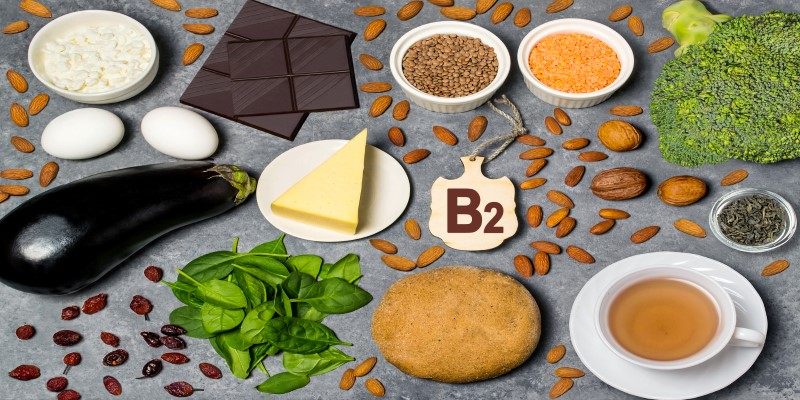The Ultimate Guide to Riboflavin (Vitamin B2): Health Benefits and Side Effects
Feb 07, 2024 By Madison Evans
In essential nutrients, riboflavin, commonly known as Vitamin B2, is significant. This water-soluble vitamin plays a crucial role in maintaining overall health and well-being. From energy production to antioxidant defence, riboflavin contributes to various physiological functions within the body. In this comprehensive guide, we'll delve into the various aspects of riboflavin, exploring its overview, benefits, dietary sources, potential side effects, and the importance it holds in our daily lives.
Riboflavin (Vitamin B2): Overview
Riboflavin, one of the eight B vitamins, is a cofactor for various enzymatic reactions in the body. It plays a pivotal role in energy metabolism, converting carbohydrates, fats, and proteins into adenosine triphosphate (ATP), the body's primary energy currency. Also, riboflavin participates in the electron transport chain, a critical cellular respiration process that generates ATP.
Furthermore, riboflavin acts as an antioxidant, scavenging harmful free radicals and protecting cells from oxidative damage. This characteristic is crucial for preserving cellular integrity and mitigating the susceptibility to chronic illnesses, such as cardiovascular conditions and specific forms of cancer.
Benefits of Riboflavin (Vitamin B2)
The benefits of riboflavin extend beyond energy production and antioxidant defence. Here are some key advantages associated with adequate riboflavin intake:
Promotes Healthy Skin
Riboflavin is vital in skin health and maintaining proper skin structure and function. It aids collagen production, a protein crucial for skin elasticity and wound healing. Additionally, riboflavin helps protect the skin from damage caused by UV radiation, reducing the risk of premature ageing and skin disorders.
Supports Vision Health
As an essential nutrient for ocular health, riboflavin plays a role in maintaining proper vision. It produces glutathione, an antioxidant that protects the eyes from oxidative stress. Adequate riboflavin intake may help reduce the risk of cataracts and age-related macular degeneration.
Boosts Red Blood Cell Production
Riboflavin is necessary for synthesizing red blood cells (erythrocytes), which transport oxygen throughout the body. A riboflavin deficiency can lead to anaemia, characterized by fatigue, weakness, and shortness of breath. Ensuring sufficient riboflavin intake is essential for maintaining optimal blood cell count and overall energy levels.
Supports Nervous System Function
Riboflavin plays a pivotal role in sustaining the optimal nervous system operation. This essential vitamin is responsible for synthesizing neurotransmitters, which serve as chemical messengers facilitating communication among nerve cells. Maintaining adequate riboflavin levels is imperative for preserving cognitive function, regulating mood, and ensuring comprehensive neurological well-being.
Assists in Metabolism of Other Nutrients
Riboflavin is crucial in metabolizing other nutrients, including folate, niacin, and vitamin B6. It helps convert these vitamins into active forms, allowing the body to utilize them effectively. This synergy between riboflavin and other B vitamins is essential for various physiological processes, including DNA synthesis, amino acid metabolism, and neurotransmitter production.

Sources of Riboflavin
While riboflavin is present in various foods, some sources are particularly rich in this essential nutrient. Here are some dietary sources of riboflavin:
Dairy Products: Milk, yoghurt, and cheese are excellent sources of riboflavin. These dairy products provide a convenient way to incorporate riboflavin into your diet.
Lean Meats and Poultry: Chicken, turkey, beef, and pork are all good sources of riboflavin. Including lean cuts of meat in your meals can help boost your riboflavin intake.
Eggs: Eggs are a versatile and nutritious food and a significant source of riboflavin. Consuming eggs regularly can contribute to meeting your riboflavin requirements.
Leafy Green Vegetables: Dark leafy greens like spinach, kale, and broccoli contain riboflavin and other essential nutrients. Adding these vegetables to your diet can enhance your overall nutrient intake.
Whole Grains: Whole grains like brown rice, quinoa, and oats are rich in riboflavin. Opting for whole-grain bread, pasta, and cereal varieties can help increase your riboflavin consumption.
Nuts and Seeds: Almonds, sunflower seeds, and peanuts are nuts and seeds that provide riboflavin. Snacking on these nutrient-dense foods can contribute to your daily riboflavin intake.
Fortified Foods: Some foods, such as breakfast cereals and nutritional yeast, are fortified with riboflavin and other vitamins and minerals. These fortified foods can be convenient sources of riboflavin, especially for individuals with dietary restrictions.
By incorporating a variety of these foods into your diet, you can ensure an adequate intake of riboflavin to support your overall health and well-being.

Side Effects of Riboflavin
Riboflavin is generally safe when ingested in appropriate quantities; however, an excessive intake may result in potential side effects. However, it's important to note that riboflavin toxicity is rare, as excess riboflavin is typically excreted in the urine. Some possible side effects of high-dose riboflavin supplementation may include:
Yellow-orange Urine: High doses of riboflavin can cause the urine to turn bright yellow or orange. This discolouration is harmless and temporary, as excess riboflavin is excreted through the urine.
Gastrointestinal Disturbances: In some cases, high doses of riboflavin supplements may cause gastrointestinal symptoms such as nausea, vomiting, diarrhoea, or abdominal cramps. These side effects are usually mild and resolve once supplementation is discontinued.
Increased Risk of Photosensitivity: An elevated intake of riboflavin can heighten the skin's susceptibility to sunlight, thereby augmenting the likelihood of experiencing sunburn or skin irritation. Individuals taking high-dose riboflavin supplements should take precautions to protect their skin from UV radiation.
Compliance with the prescribed dosage guidelines and consulting with a healthcare professional before commencing any supplementation routine, especially when contemplating increased dosages, is crucial.
Conclusion
Riboflavin (Vitamin B2) is a vital nutrient that plays numerous roles in maintaining overall health and well-being. From energy metabolism to antioxidant defence, riboflavin is involved in various physiological processes essential for optimal functioning. Ensuring sufficient riboflavin intake is essential for meeting your nutritional requirements. This can be achieved through a well-balanced diet that includes dairy products, lean meats, eggs, leafy greens, whole grains, nuts, and seeds.







